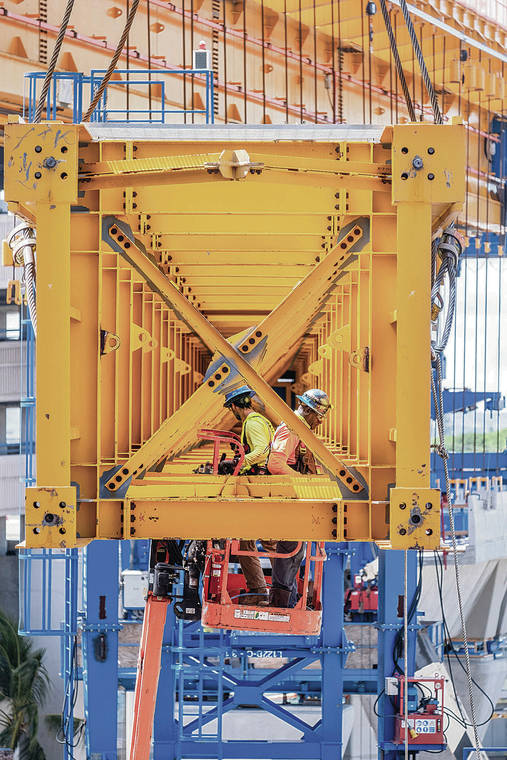Rail project expecting $100M shortfall, possibly $100M more

DENNIS ODA / APRIL 27
The HART project was supposed to receive $100 million in federal funding earlier this year but the amount was withheld. Two workers continue construction of the rail at Daniel K. Inouye International Airport.
The Honolulu Authority for Rapid Transit got grim financial news Thursday, with no easy answers ahead.
Tax revenue needed to fund the financially troubled HART project is expected to fall by $100 million over the next few months in response to the COVID-19 Opens in a new tab pandemic — and the problem could get worse by another $100 million if a critical construction contract is not awarded in July, HART’s directors were told Thursday.
Ruth Lohr, HART’s chief financial officer, told directors that income from general excise and transient accommodation taxes have plummeted as the pandemic stifled Oahu’s tourism industry.
She’s projecting tax shortfalls through October will add up to $100 million. The city’s rail project is currently projected to cost $9.2 billion.
And if a critical “P3” public-private partnership contract to build the final segment of the 20-mile, East Kapolei-to-Ala Moana line is not agreed to by a July 23 deadline, the Federal Transit Administration could withhold another $100 million in badly needed financing.
The rail project is funded primarily through a 0.5% general excise tax surcharge on Oahu and a 1-percentage-point increase in the statewide hotel room tax or transient accommodations tax.
Don't miss out on what's happening!
Stay in touch with breaking news, as it happens, conveniently in your email inbox. It's FREE!
“Honestly, I don’t think we’re going to get any TAT (transient accommodations tax) money for a while,” HART director Dean Hazama said during Lohr’s financial update.
Before Lohr’s presentation, HART director Hoyt Zia asked whether there’s a backup plan if no P3 agreement is reached.
“You’ve always expressed great confidence that the P3 bidding will work, we’ll end up with a bidder,” Zia told Andrew Robbins, HART’s CEO and executive director.
“But, with the new uncertainty … what is the alternative, or the exit strategy, if come July there are no bids or the bids are unacceptable?” Zia asked.
Robbins declined to provide specifics, saying they could jeopardize the current P3 negotiations.
But he insisted “there is a strategy” if no company makes a bid on the project.
Robbins said that all of the “short-listed” potential bidders are “still with us. That’s a big plus. … We are expecting bids in July per our schedule.”
The $100 million in federal funding had been projected to arrive earlier this year, but federal officials withheld it until they see the details of HART’s P3 contract.
In response to questions, Lohr provided no simple solutions to cover the expected shortfall.
She said “it’s not the best time” to raise money through the bond market because of current market volatility.
And transit construction projects across the country like HART’s are not currently eligible for CARES Act funding.
“In terms of what Congress might do, that may be a ways off yet,” Robbins added.




